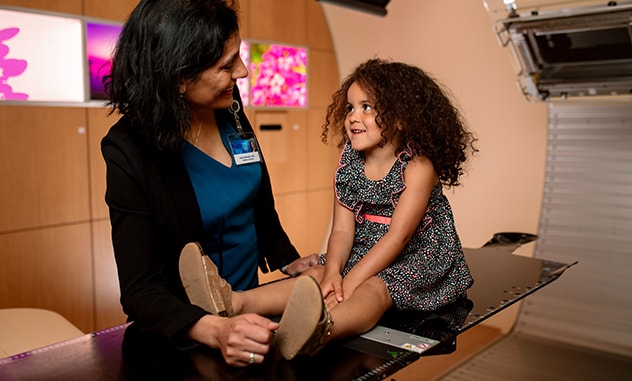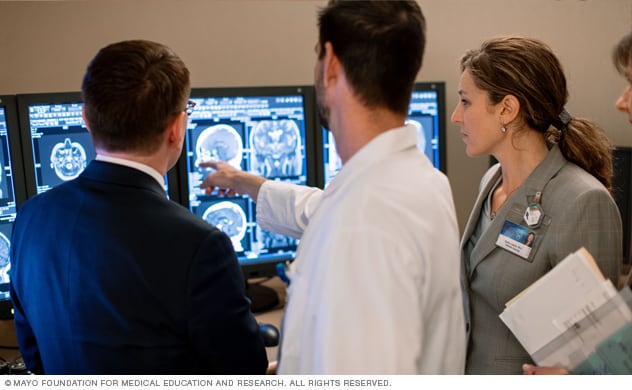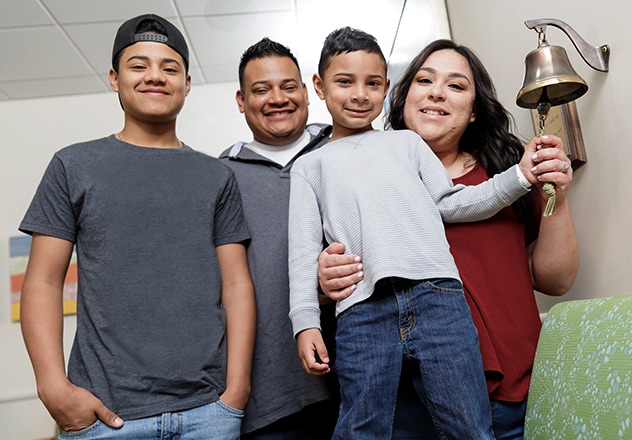Overview
Getting the best care when your child has a brain tumor
As part of the Mayo Clinic Children's Center, specialists in the Pediatric Brain Tumor Clinic evaluate and treat children with many types of brain tumors, which may be cancerous (malignant) or not cancerous (benign).
Treatment of brain tumors in children can be very different from treatment in adults. At Mayo Clinic, pediatric experts work together to deliver the most personalized, effective treatment for your child in a family-friendly environment.
Specialists in Mayo Clinic's Pediatric Brain Tumor Clinic have significant expertise and experience in dealing with a wide range of brain tumors in infants, children and teenagers, such as:
- Gliomas. These tumors begin in the brain or spinal cord. Mayo Clinic experts treat all types of gliomas, including astrocytomas, ependymomas and oligodendrogliomas.
- Medulloblastoma. The most common cancerous brain tumor in children, a medulloblastoma starts in the lower back part of the brain, called the posterior fossa, and tends to spread through spinal fluid.
- PNETs. Primitive neuroectodermal tumors (PNETs) are rare, cancerous tumors that start in embryonic (fetal) cells in the brain. They can occur anywhere in the brain — for example, in the cerebrum (supratentorial region) or the pineal gland.
- Germ cell tumors. Germ cells usually develop into sperm and eggs. Germ cell tumors may develop during childhood where the testicles or ovaries will form. But sometimes germ cell tumors move to other parts of the body, such as the brain.
- Spinal cord tumor. A spinal cord tumor develops within or near the spinal cord or within bones of the spine. It can affect nerves in the area of the tumor, causing pain, neurological problems and sometimes paralysis.
- Craniopharyngioma. This rare, noncancerous tumor starts near the brain's pituitary gland, which secretes hormones that control many body functions. As the craniopharyngioma slowly grows, it can affect the pituitary gland and other structures near the brain.
Top-ranked center
Mayo Clinic Children's Center in Rochester is ranked the No. 1 hospital in Minnesota, and the five-state region of Iowa, Minnesota, North Dakota, South Dakota and Wisconsin, according to U.S. News & World Report's 2024–2025 "Best Children's Hospitals" rankings. These rankings are based on surgical survival, parent and family involvement, clinical research and recommendations by pediatric oncologists and pediatric neurologists and neurosurgeons across the nation.
The Mayo Clinic Comprehensive Cancer Center meets strict standards for a National Cancer Institute comprehensive cancer center, recognizing scientific excellence and a multispecialty approach focused on cancer prevention, diagnosis and treatment.
Mayo Clinic is a member of the Children's Oncology Group. This large collaboration among hospitals gives children with brain tumors access to clinical trials that offer the latest in treatments for childhood cancers.
Latest treatments and technology

A Mayo Clinic radiation oncologist helps put a young girl at ease while explaining the procedure for proton beam therapy, the latest cancer treatment for children with certain types of tumors.
Mayo Clinic has long been a destination for parents seeking answers and the best treatment for their children's medical conditions. These are just a few of the approaches that are transforming medical care for children with brain tumors:
- Mayo neurosurgeons have extensive experience in tumor removal in children, while minimizing damage to healthy tissue. Mayo Clinic's expertise in computer-assisted brain surgery allows neurosurgeons to precisely locate tumors and remove them using the safest and least invasive route possible. Brain-mapping techniques, intraoperative MRI and awake brain surgery help surgeons operate without injuring critical areas of the brain.
- Mayo Clinic's Proton Beam Therapy Program provides the latest cancer treatment for children with certain types of tumors. Compared with conventional radiation therapy, proton beam therapy targets the tumor more precisely, allowing controlled doses while sparing surrounding healthy tissues and organs.
- Mayo Clinic's Center for Individualized Medicine has an Individualized Medicine Clinic. A multispecialty team of experts work closely with patients and their physicians to determine whether a patient is a good candidate for tests to identify genetic changes that could help guide treatment. Patients are considered for the Individualized Medicine Clinic on a case-by-case basis.
Team approach, tailored to your child's needs

A team of pediatric brain tumor experts at Mayo Clinic discuss a child's brain scan and work together to form the best treatment plan.
Using a team approach, Mayo Clinic coordinates care across many specialties and subspecialties, bringing the Pediatric Brain Tumor Clinic team members together on a weekly basis to discuss treatment plans specific to each child.
Typically, a pediatric neuro-oncologist specializing in brain tumors will be your children's primary doctor, coordinating access to other specialists on the team. Pediatric physician specialties include:
Vital team members also include a nurse coordinator, social worker and others as needed.

A Mayo Clinic patient and his family are all smiles as the young boy rings the bell to celebrate the end of his treatment with proton beam therapy.
More on Mayo Clinic care and research
Read more about pediatric brain tumors, including:
- Care at Mayo Clinic
- Patient stories
- Clinical trials
- Research in pediatric hematology and oncology and neuro-oncology
Appointments
Make an appointment at Mayo Clinic Children's Center and learn about patient services.
For medical professionals
Read current and back issues of Neurosciences Update, a publication for physicians that highlights current trends and advances in neurology and neurosurgery at Mayo Clinic.